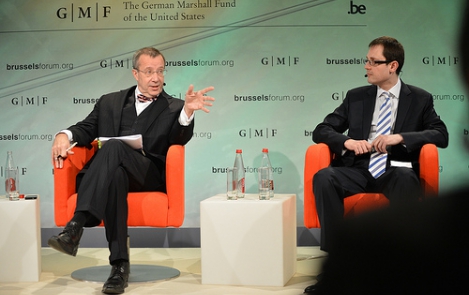-
Reset
+


President Ilves: efficient data protection requires greater co-operation between the private sector and governments
17.03.2013
The President, Toomas Hendrik Ilves, took part in an influential foreign and security policy conference, Brussels Forum 2013, from Friday until today, at which he spoke about information security issues and discussed freedom, transparency and the security of the Internet. Today, the Estonian Head of State also gave a presentation at an online-broadcast of the conference, where he discussed cyber defence with the Swedish Minister for Foreign Affairs, Carl Bildt, and IBM's Head of Global Cyber Security Analysis, Nick Coleman; the panel was chaired by the prominent BBC journalist, Nik Gowing.
In speaking about data protection, President Ilves said that we are are too stuck in the old ways of thinking, where we fear government as if it was the 'Big Brother', by failing to understand the data protection threats faced by the private sector, which the government could help to prevent by providing security measures. In order to ensure our privacy, we need closer co-operation between governments and companies, emphasised the Estonian Head of State.
When addressing cyber defence, he recalled that cyber attacks are not only about websites and electronic communication; also, we cannot draw a clear line between attacks against military objects, as today, all the vital services we use depend on systems that rely on information technology – all the infrastructures are also information infrastructures.
President Ilves, who has been chairing, at the request of the European Commission, the Steering Board of the European Cloud Partnership since last autumn, said that for secure data processing, it is critical which data storage methods we use, as: "The most important question to be asked when speaking about cyber security is how well a system can identify users of data. The two-level authentication system, used in Estonia, is not very widely used anywhere else in the world, though a similar system has been suggested by Google. This will help to ensure the identity of a person logging into an information environment – password-based logging systems are unable to ensure the same efficiency level," President Ilves told.
According to the President, the main problem with cyber defence involves difficulties with identifying attackers, compared to regular attacks, and the fact that not all governments are interested in co-operating to protect the freedom and security of cyber environments.
Furthermore, legislation is often slow in following real developments. President Ilves recalled that while there are may different rules and regulations for handling different hazards – such as, poisonous substances, etc. – the development of such guidelines for cyber environment was only recently started. NATO's Cooperative Cyber Defence Centre of Excellence in Tallinn recently published Tallinn Manual, a manual on the application of international law in the case of cyber defence. President Ilves also presented the book to the audience of the conference during his presentation.
Additional information and web-based records of the discussions are available from the website of the conference at brussels.gmfus.org.
Office of the President
Public Relations Department
Phone +372 631 6229




